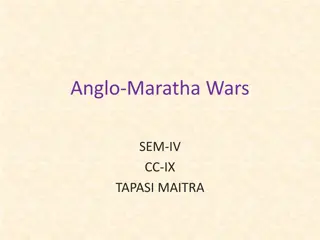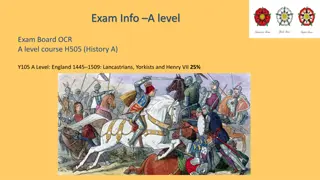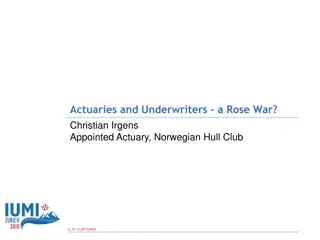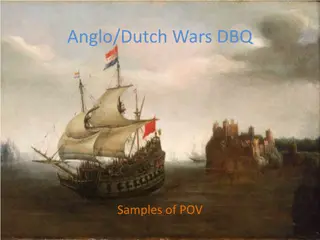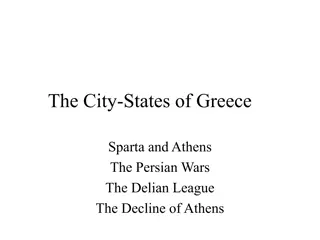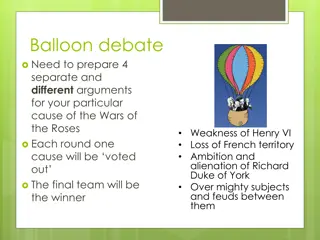
Insights into Gallic Society and the Role of Druids in Gaul from Gallic Wars VI
Explore the societal structure in Gaul as depicted in Gallic Wars VI, focusing on the distinction between different classes, the influence of powerful individuals, the role of Druids in religious and civil matters, and the severe consequences faced by those prohibited by the Druids. Gain insights into the intricate workings of Gaulish society and the dynamics of power and honor within it.
Download Presentation

Please find below an Image/Link to download the presentation.
The content on the website is provided AS IS for your information and personal use only. It may not be sold, licensed, or shared on other websites without obtaining consent from the author. If you encounter any issues during the download, it is possible that the publisher has removed the file from their server.
You are allowed to download the files provided on this website for personal or commercial use, subject to the condition that they are used lawfully. All files are the property of their respective owners.
The content on the website is provided AS IS for your information and personal use only. It may not be sold, licensed, or shared on other websites without obtaining consent from the author.
E N D
Presentation Transcript
numero here means position/ rank aliquo numere atque honore = of any number and distinction plebes here is 5th declension, not 3rd adhibeo, adhibere, adhibui, adhibitus = hold towards/ bring/ summon plerique, plereaque, pleraque = most/ very many/ a great many aes alienum = bronze (debt) belonging to another (is the situation for debtors in Rome better than in Gaul?) tributum, -i = taxes iniuria potentiorum = by the violence of the powerful (without a judicial system, the only protection from powerful men was a powerful man) Gallic Wars VI.13 [13] In omni Gallia eorum hominum, qui aliquo sunt numero atque honore, genera sunt duo. Nam plebes paene servorum habetur loco, quae nihil audet per se, nullo adhibetur consilio. Plerique, cum aut aere alieno aut magnitudine tributorum aut iniuria potentiorum premuntur, sese in servitutem dicant nobilibus: in hos eadem omnia sunt iura, quae dominis in servos. servitutem = service dico, -are, -avi, -atus = dedicate/ consecrate/ give over in hos here means over them
druides, druidum (m) = Druids, the priests of Gaul equitum here is the nobility of the Gauls rebus divinis means the worship of the gods intersum, interesse, interfui, interfuturum = be among/ be present at/ be in charge of procuro, procurare, procuravi, procuratus = take care of/ look after religio, religionis (f) = piety/ religious matters/ rites/ rituals disciplina, -ae = teachings/ trainings because of the Druid s involvement in both religious and civil matters, later Roman emperors would act to suppress them Sed de his duobus generibus alterum est druidum, alterum equitum. Illi rebus divinis intersunt, sacrificia publica ac privata procurant, religiones interpretantur: ad hos magnus adulescentium numerus disciplinae causa concurrit, magnoque hi sunt apud eos honore. Nam fere de omnibus controversiis publicis privatisque constituunt, et, si quod est admissum facinus, si caedes facta, si de hereditate, de finibus controversia est, idem decernunt, praemia poenasque constituunt; si qui aut privatus aut populus eorum decreto non stetit, sacrificiis interdicunt. Haec poena apud eos est gravissima. facinus, facinoris (n) = bad deed/ crime/ action hereditas, hereditatis (f) = inheritance idem = likewise/ also/ the same men decerno, decernere, decrevi, decretus = judge/ decide qui here means any(one) aut privatus aut populus means either individual or an entire tribe decretum, -i = decree/ decision
interdico, interdicere, interdixi, interdictus = forbid/ prohibit quibus ita est interdictum = to whom it has been prohibited in this way/ against whom such a prohibition has been made numero = in number/ among impius, -a, -pum = wicked sceleratus, -a, -um = criminal habentur here means are held or are considered contagio, contagionis (f) = contract patentibus ius = when they seek justice Quibus ita est interdictum, hi numero impiorum ac sceleratorum habentur, his omnes decedunt, aditum sermonemque defugiunt, ne quid ex contagione incommodi accipiant, neque his petentibus ius redditur neque honos ullus communicatur.
excello, excellere, excellui = rise up/ excel suffragium, -i = ballot/ vote non numquam = not never/ sometimes take armis (this phrase) into consideration when later reading about the Druids being exempt from military duties loco consecrato = the consecrated spot, probably a sacred grove pareo, parere, parui +dat. = obey His autem omnibus druidibus praeest unus, qui summam inter eos habet auctoritatem. Hoc mortuo aut si qui ex reliquis excellit dignitate succedit, aut, si sunt plures pares, suffragio druidum, nonnumquam etiam armis de principatu contendunt. Hi certo anni tempore in finibus Carnutum, quae regio totius Galliae media habetur, considunt in loco consecrato. Huc omnes undique, qui controversias habent, conveniunt eorumque decretis iudiciisque parent. Disciplina in Britannia reperta atque inde in Galliam translata esse existimatur, et nunc, qui diligentius eam rem cognoscere volunt, plerumque illo discendi causa proficiscuntur. reperio, reperire, repperi, repertus = find/ discover/ invent/ develop illo = to that place/ there disco, discere, didici = learn
militia, -ae = military service vacatio, vacationis (f) = freedom immunitas, immunitatis (f) = exemption sponte = by one s own accord propinquus, -a, -um = nearby/ relative versus, versus = verse (why poetic verse/ song?) edisco, ediscere, edidici = learn thoroughly/ memorize fas = proper/ right (fas and nefas (sin) have a religious connotation) Gallic Wars VI.14 [14] Druides a bello abesse consuerunt neque tributa una cum reliquis pendunt; militiae vacationem omniumque rerum habent immunitatem. Tantis excitati praemiis et sua sponte multi in disciplinam conveniunt et a parentibus propinquisque mittuntur. Magnum ibi numerum versuum ediscere dicuntur. Itaque annos nonnulli vicenos in disciplina permanent. Neque fas esse existimant ea litteris mandare, cum in reliquis fere rebus, publicis privatisque rationibus Graecis litteris utantur. litteris here means writing/ the Greek alphabet, which the Gauls used to represent their own language. mando, -are, -avi, -atus = hand over/ entrust rationibus = accounts
mihi = one of the few places Caesar uses 1st person singular, referring to Caesar the author (not Caesar the general) instituo, instituere, institui, institutus = draw up/ train/ begin/ decide upon/ adopt in vulgum efferi the details of the teachings to become widely known velint Caesar uses the subjunctive here because he is representing someone else s explanation; note how Caesar changes from subjunctive to indicative later as a way of saying in fact what Caesar thinks of as fact confisos here means to rely upon; confisos litteris means because they relied on written texts (Plato had a similar argument that literacy destroyed memory) studeo, studere, studui + dat. = be eager for. apply oneself in fere = generally/ usually perdisco, perdiscere, perdidici = learn thoroughly/ memorize remittant here means they slack off/ relax Id mihi duabus de causis instituisse videntur, quod neque in vulgum disciplinam efferri velint neque eos, qui discunt, litteris confisos minus memoriae studere: quod fere plerisque accidit, ut praesidio litterarum diligentiam in perdiscendo ac memoriam remittant. In primis hoc volunt persuadere, non interire animas, sed ab aliis post mortem transire ad alios, atque hoc maxime ad virtutem excitari putant metu mortis neglecto. Multa praeterea de sideribus atque eorum motu, de mundi ac terrarum magnitudine, de rerum natura, de deorum immortalium vi ac potestate disputant et iuventuti tradunt. in primis = in the first things/ particularly/ especially ab aliis ad alios = from some to others (from an individual in one lifetime to another in a later incarnation) excitari = it is inspired/ men are inspired intereo, interire. interii, interitus = perish/ die anima, -ae = soul mundus, -i = world/ universe disputo. are, -avi, -atus = weigh/ examine/ investigate iuventus, iuventutis (f) = youth/ young people
alterum this picks up from Chapter 13, where Caesar mentioned two classes of people Hi omnes notice the hyperbaton usus here means need incido, incidere, incidi = fall upon/ happen/ occur quotannis = every year propulso, -are, -avi, -atus = drive back/ repel ut ita = as so; atque eorum ut quisque est ita habet = and in proportion as each is in such a proportion each of them has genere here means family amplus, -a, -um = great/ abundant/ splendid/ distinguished (amplissimus was often used by the Romans to describe someone holding very high office) Gallic Wars VI.15 [15] Alterum genus est equitum. Hi, cum est usus atque aliquod bellum incidit (quod fere ante Caesaris adventum quotannis accidere solebat, uti aut ipsi iniurias inferrent aut illatas propulsarent), omnes in bello versantur, atque eorum ut quisque est genere copiisque amplissimus, ita plurimos circum se ambactos clientesque habet. Hanc unam gratiam potentiamque noverunt. ambactus, -i = retainer/ vassal (a Celtic word whose exact meaning is not known, but seems to hold higher status than a cliens); ambactos clientesque powerful men are surrounded by crowds of men who obey them; c.f. Orgetorix gratiam here means sourse of influence nosco, noscere, novi, notus = get to know; hanc noverunt = they know this single influence and power
admodum = up to the emasure dedo, dedere, dedidi, deditus = hand over/ devote; dedita religionibus means devoted to religious ceremonies and superstitions; Note how the religious Romans were wary of/ critical of overly-religious/ superstitious cultures morbus, -i = sickness/ disease/ illness in proeliis periculisque is an example of hendiadys immolo, =are, -avi, -atus = slay/ sacrifice veveo, vovere, vovi, votus = pledge/ vow administer, administri = attendant/ assistant; administris Druidibus means Druids as officiating priests pro vita reddatur notice the chiasmus. Gallic Wars VI.16 [16] Natio est omnis Gallorum admodum dedita religionibus, atque ob eam causam, qui sunt adfecti gravioribus morbis quique in proeliis periculisque versantur, aut pro victimis homines immolant aut se immolaturos vovent administrisque ad ea sacrificia druidibus utuntur, quod, pro vita hominis nisi hominis vita reddatur, non posse deorum immortalium numen placari arbitrantur, publiceque eiusdem generis habent instituta sacrificia. The religion of the Celts, like that of the Romans was based on a quid pro quo relationship with the gods. placo, -are, -avi, -atus = placate/ appease publice this word indicates that not only were some of the sacrifices held in public, but they were meant for the benefit of the whole community as opposed to individuals instituta = established/ carried out/ performed; habent instituta = they have established
immanis, -is, -e = enormous/ huge simulacrum, -i = image/ figure contexo, contexere, contexui, contextus = weave together/ weave vimen, viminis (n) = twig/ small branch/ wicker exanimantur here means killed supplicium, -i = punishment/ death sentence; supplicia arbitrantur note the hyperbaton furtum, -i = theft lagtrocinium, -i = robbery noxia, -ae = crime gratus, -a, -um +dat. = pleasing to descendunt = resort to/ sink down to Alii immani magnitudine simulacra habent, quorum contexta viminibus membra vivis hominibus complent; quibus succensis circumventi flamma exanimantur homines. Supplicia eorum qui in furto aut in latrocinio aut aliqua noxia sint comprehensi gratiora dis immortalibus esse arbitrantur; sed, cum eius generis copia defecit, etiam ad innocentium supplicia descendunt.
What is Mercury the god of? Why does Caesar mention this first? The gods mentioned in this chapter are not Roman gods, but Celtic gods thought to have the same powers as the Roman god mentioned. Identifying a god of one group with that of another is called syncretism. c.f. Sulis Minerva in Bath, England. The Celtic name for the god identifioed with Mercury may have been Lugus for whom ethe city Lugdunum (modern day Lyon) got its name. colo, colere, colui, cultus = cultivate/ worship/ pay attention to ferunt they say initiates an indirect statement; notice the anaohora and asyndeton between clauses ducem here means guide ad here means for quaestus, -us (m) = gain/ acquisition mercatura, -ae = business/ trade Notice the polysyndeton in the last sentence. Gallic Wars VI.17 [17] Deum maxime Mercurium colunt. Huius sunt plurima simulacra: hunc omnium inventorem artium ferunt, hunc viarum atque itinerum ducem, hunc ad quaestus pecuniae mercaturasque habere vim maximam arbitrantur. Post hunc Apollinem et Martem et Iovem et Minervam. It is possible that Lugus was a triune god, comprising Esus, Titutatis, and Toransis, the three chief deities mentioned by Lucan. The "threefold death" in Celtic human sacrifice may reflect the triplicity of this god.
opinio, opinionis (f) = way of thinking/ opinion; eandem opinionem note the hyperbaton artificium, artificii = craft caelestis, -is, -e = celestial/ of the sky/ heavenly; caelestium as a substantive means of the heavenly ones/ gods dimico, -are, -avi, -atus = fight devoveo, devovere, devovi, devotus = vow/ dedicate exstruo, exstruere, exstruxi, exstructus = build (be careful of all the substntives here) tumulus, -i = mound consecro, -are, -avi, -atus = dedicate/ consecrate conspicor, conspicati, conspicatus sum = catch sight of neque saepe accidit is an example of litotes De his eandem fere, quam reliquae gentes, habent opinionem: Apollinem morbos depellere, Minervam operum atque artificiorum initia tradere, Iovem imperium caelestium tenere, Martem bella regere. Huic, cum proelio dimicare constituerunt, ea quae bello ceperint plerumque devovent: cum superaverunt, animalia capta immolant reliquasque res in unum locum conferunt. Multis in civitatibus harum rerum exstructos tumulos locis consecratis conspicari licet; neque saepe accidit, ut neglecta quispiam religione aut capta apud se occultare aut posita tollere auderet, gravissimumque ei rei supplicium cum cruciatu constitutum est. quispiam, quaepiam, quodpiam = anyone/ any occulto, -are, -avi, -atus = conceal/ hide ei rei can mean here for this crime or for him (referring to the quispiam) cruciatus, -us = torture
Dis, Ditis = name for the god Pluto, derived from dives; ab dite patre can have various motivations; it can mean sprung from the earth (autochthonous) providing religious and organic claims to the land people occupied, or it could refer to being descended from the dead, like the manes of the Romans. prognatus, -a, -um = sprung from praedico, praedicere, praedixi, praedictus = proclaim publicly/ declare non numero dierum sed noctium = not by the number of days, but by the number of nights; the Gauls began the new day at sunset; modern society follows the Roman custom of splitting the night in half how strange is our own custom?! finiunt = they measure Gallic Wars VI.18 [18] Galli se omnes ab Dite patre prognatos praedicant idque ab druidibus proditum dicunt. Ob eam causam spatia omnis temporis non numero dierum sed noctium finiunt; dies natales et mensum et annorum initia sic observant ut noctem dies subsequatur. In reliquis vitae institutis hoc fere ab reliquis differunt, quod suos liberos, nisi cum adoleverunt, ut munus militiae sustinere possint, palam ad se adire non patiuntur filiumque puerili aetate in publico in conspectu patris adsistere turpe ducunt. adolesco, adolescere, adolevi, adultus = grow up munus, muneris (n) = duty/ obligation/ gift palam = openly/ publicly puerilis, -is, -e = childish/ youthful aetas, aetatis (f) = age adsisto, adsistere, adstiti = stand nearby; filium adsistere = they consider it disgraceful for a son (this would seem strange to a Roman)
quantas = as (with tantas = as much) dos, dotis (f) = dowry; dotis nomine = under the name of dowry/ as a dowry/ under a bond (or promissory note) of dowry bona = goods aestimatio, aestimationis (f) = assessment/ accounting; aestimatione facta = after n appraisal has been made communicant here means they mingle; Gallic custom insisted that husband and wife pool equal shares of their resources when they formed a household; Roman custom insisted that husbands and wives kept everything in separate accounts; what are the social impacts/ implications of these practices? Gallic Wars VI.19 [19] Viri, quantas pecunias ab uxoribus dotis nomine acceperunt, tantas ex suis bonis aestimatione facta cum dotibus communicant. Huius omnis pecuniae coniunctim ratio habetur fructusque servantur: uter eorum vita superarit, ad eum pars utriusque cum fructibus superiorum temporum pervenit. coniunctim = together/ jointly ratio economic relations between husbands and wives are strictly regulated as the wider circles of their families have an economic interest at stake fructus, fructus = fruit/ profit vita superarit has survived in life (has outlived the other)
nex, necis (f) = killing/ death; Roman marriages during Caesar s time were sine manu, but in earlier Rome were cum manu, similar to the Gallic marriages described here illustris, -is, -e = bright/ clear/ famous/ distinguished decessit = has gone away/ has died de uxoribus is this a mistake? or did the Gauls practice polygamy? in servilem modum = in the manner of slaves (i.e. with torture) quaestio, quaestionis (f) = inquiry/ investigation; quaestionem habere is a term from Roman law comperio, comperire, comperi, compertus = find out/ discover; compertum est is an impersonal passive; si compertum est = if it has been proved excrucio, -are, -avi, -atus = torture; excruciatas = after the women have been tortured Viri in uxores, sicuti in liberos, vitae necisque habent potestatem; et cum paterfamiliae illustriore loco natus decessit, eius propinqui conveniunt et, de morte si res in suspicionem venit, de uxoribus in servilem modum quaestionem habent et, si compertum est, igni atque omnibus tormentis excruciatas interficiunt. Funera sunt pro cultu Gallorum magnifica et sumptuosa; omniaque quae vivis cordi fuisse arbitrantur in ignem inferunt, etiam animalia, ac paulo supra hanc memoriam servi et clientes, quos ab eis dilectos esse constabat, iustis funeribus confectis una cremabantur. pro cultu = in proportion to their [level of] civilization sumptuosus, -a, -um = expensive/ costly cordi esse = to be dear to the heart/ to be loved; with vivis this is a double dative paulo memoriam = not too long before living memory diligo, diligere, dilexi, dilectus = desire/ love/ value highly iustis funeribus is the funeral proper cremo, -are, -avi, -atus = burn
sancio, sancire, sanxi, sanctus = make holy/ appoint/ establish; habent legibus sanctem = have established by law that / have made it binding by law that neve here means and not temerarius, -a, -um = rash/ reckless ad facinus consilium capere people do bad things or make inappropriate decisions because they are afraid de summis capere = make decisions about life and death quae visa sunt = [those things] which semmed best [to be kept secret] occultari is ellipted/ understood in the relative clause deduced from the main clause Gallic Wars VI.20 [20] Quae civitates commodius suam rem publicam administrare existimantur, habent legibus sanctum, si quis quid de re publica a finitimis rumore aut fama acceperit, uti ad magistratum deferat neve cum quo alio communicet, quod saepe homines temerarios atque imperitos falsis rumoribus terreri et ad facinus impelli et de summis rebus consilium capere cognitum est. Magistratus quae visa sunt occultant quaeque esse ex usu iudicaverunt multitudini produnt. De re publica nisi per concilium loqui non conceditur. ex usu = of use/ useful prodo, prodere, prodidi, proditus = give forth/ reveal/ betray/ hand down concilium Gauls did not have the free speech to assemple on their own; but only under recognized leaders; Caesar write that Romans themselves enjoy a high level of freedom of speech as individuals (not particularly perhaps in assemblies in the Roman world either though)

